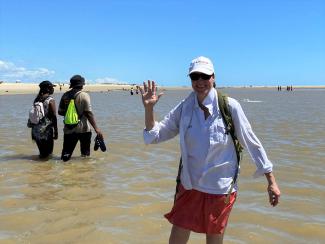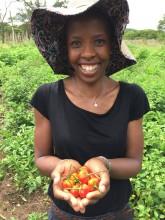Dr. Catherine Picard and Dr. Moliehi Shale are members of the leadership team for the USAID Alternatives to Charcoal Project, which is implemented by Tetra Tech ARD and represents a planned U.S. Government five-year investment of approximately $30 million.
"I am driven by challenges. I thrive on learning about tough challenges and then working to identify and implement solutions."
Dr. Picard has over twenty years of experience in international development, primarily in sub Saharan Africa. Her areas of expertise include artisanal mining and responsible supply chains (especially conflict minerals), clean cooking, community-based conservation and governance, strengthening local livelihoods, and the intersection of natural resources, business and human rights. She currently serves as the Chief of Party for the USAID Alternatives to Charcoal project in Zambia. Previously Dr. Picard oversaw a USAID-funded responsible minerals project in the DRC and a USAID biodiversity project in Madagascar. Dr. Picard also served for three years with the U.S. State Department’s Bureau of African Affairs as a natural resource officer, and five years with the MacArthur Foundation’s International grantmaking program. She holds a Ph.D. in Political Ecology from Yale University and a Masters and Undergraduate degree from University of Michigan and the University of California at Berkeley, respectively.
"I urge female development practitioners like myself to share more of themselves and their work and for young people to take an interest in subjects and activities that can usher them into development work."
Dr. Moliehi Shale is a climate change research and development professional with more than 10 years of experience in the sector. She is currently the Private Sector Engagement Coordinator in the USAID-funded Alternatives to Charcoal project. She has previously worked in senior consulting positions with UNECA, Millennium Challenge Fund and DFID amongst others. Moliehi has also done extensive consulting work in business development services, livelihoods restoration and sustainable agriculture value chains in the Southern African region. Moliehi holds a PhD and Master’s degree from the University of Cape Town, and a BA in Town and Regional Planning from the National University of Lesotho.
What drives your passion for serving in development assistance?
(Dr. Picard) I am driven by challenges. I thrive on learning about tough challenges and then working to identify and implement solutions. Whether I am working to address conflict diamonds or Zambia’s consumption of charcoal, I believe positive and sustained change is possible. I’m also driven by the resilience, commitment and creativity of my colleagues and the beneficiaries we work with – they are an inspiration.
(Dr. Shale) My belief that sustainable solutions for the continent’s development problems will come from within – from Africans committed to the development of the continent, working, and living in Africa (ideally). I have been educated and worked both on the continent and abroad. I feel that living and working in an African country have helped me appreciate our challenges more but also brought me to be more present to the resources around us – particularly those housed in our creative and talented young African men and women. The challenges are many and complex, but I have an opportunity to actively participate in solution seeking and problem solving in the communities that I understand and identify closely with.
What advice can offer to young people and other women considering a career in development?
(Dr. Shale) When I was younger, I associated the development space with old, Caucasian men. I think I became aware of the role of women in development during my undergraduate study – and even then, I did not know many of those women personally. My exposure has changed this view significantly, but I also know that many young people/women are still unaware of the spaces they can take up in the development of this continent. I urge female development practitioners like myself to share more of themselves and their work and for young people to take an interest in subjects and activities that can usher them into development work. The list of these is endless and there is no right or wrong path to getting there – but they must be deliberate about their interest in our shared development challenges.
(Dr. Picard) Working in development is not easy, and women and youth can face particular challenges. My advice is first to believe in yourself but also be empathetic as your ability to understand the feelings and perspectives of others is critical. Second, humor and patience are important traits to cultivate. Third, build the capacity of those around you; you are only as successful as your team. Finally, be kind to yourself. Development work can be exhausting, frustrating and sometimes dangerous. Take the time to recharge when you need to.
Please share a moment which reinforced your career choice.
(Dr. Picard) It’s hard to pick just one or two! However, exporting the first batch of conflict-free, responsible gold from Eastern DRC to the United States was a major accomplishment that took years of work by many dedicated people. I cried when I saw the plane take off. I also treasure the many memorable moments I spent in the field and having the opportunity to hear directly from people about how a development intervention was impacting their lives.
(Dr. Shale) About a year ago I was invited to my son’s first-grade class to talk about what I do. I wanted to describe climate change and its effects on the African continent and the role of research in identifying and responding to our unique challenges. The children’s knowledge of climate change and how it presents itself in our communities blew me away. Not only were they engaged, but they could also relate it to events in Zambia. It was heartwarming to see the interest at such a young age and I hope it will translate to more of our African children pursuing careers in development on the continent.

Dr. Catherine Picard

